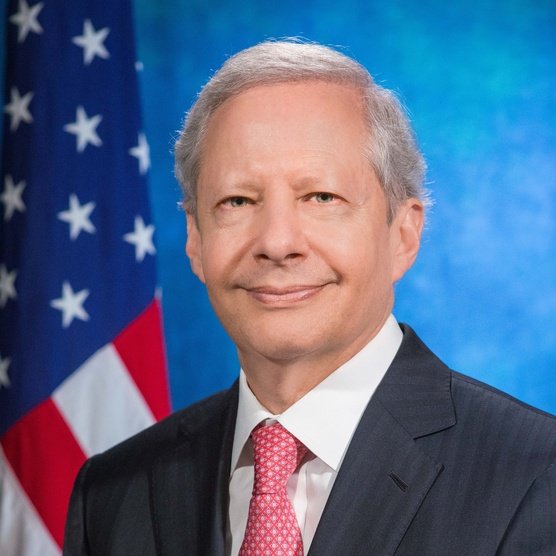Kenneth I. Juster is a distinguished fellow at the Council on Foreign Relations. He has over forty years of experience as a senior government official, senior business executive, and senior law partner. He recently completed service as the twenty-fifth U.S. ambassador to the Republic of India (2017–2021). He previously served in the U.S. government as deputy assistant to the president for international economic affairs, on both the National Security Council and the National Economic Council (2017), undersecretary of commerce (2001–2005), counselor (acting) of the State Department (1992–1993), and deputy and senior advisor to Deputy Secretary of State Lawrence Eagleburger (1989–1992). In the private sector, Juster has been a partner at the global investment firm Warburg Pincus (2010–2017), a senior executive at Salesforce.com (2005–2010), and a senior partner at the law firm Arnold & Porter.
As the U.S. ambassador to India, Juster led the third-largest U.S. mission in the world, with approximately 2,500 employees representing over thirty U.S. government departments, agencies, and offices. As part of Juster’s responsibilities, he also oversaw the U.S. relationship with the Kingdom of Bhutan, with which the United States does not currently have formal diplomatic relations, but significantly expanded its interactions.
During his tenure as U.S. Ambassador to India, Juster participated in the development of the U.S. government’s Indo-Pacific strategy and the relaunching of the Quadrilateral Security Dialogue involving the United States, Australia, India, and Japan, including ministerial meetings in 2019 and 2020. He also participated in three U.S.-India 2+2 Ministerial Dialogues, involving the top diplomatic and defense officials from the two countries, as well as the Global Entrepreneurship Summit, cosponsored by the United States and India in November 2017. In addition, Juster was involved in bilateral cooperation in the wake of the Pulwama terrorist attack in February 2019 and China’s military buildup on India’s northern border in 2020. For his service, Juster received the Secretary’s Distinguished Service Award from the State Department, the Department of Defense Medal for Distinguished Public Service, the National Intelligence Exceptional Achievement Medal, and the Secretary’s Award of Excellence from the Department of Energy.
Juster previously served from January to July 2017 as the deputy assistant to the president for international economic affairs and deputy director of the National Economic council. He was a senior member of both the National Security Council and the National Economic Council. He helped establish the U.S.-Japan Economic Dialogue and the U.S.-U.K. Economic Dialogue. He also served as the president’s representative and lead U.S. negotiator (also known as a Sherpa) in the run-up to the 2017 Group of Seven summit in Taormina, Italy.
Prior to that, from 2010 to 2017, Juster was a partner and managing director at the global investment firm Warburg Pincus LLC, where he focused on geopolitical risk, global public policy, regulatory matters, and environmental, social, and governance issues.
From 2005 to 2010, Juster was executive vice president of law, policy, and corporate strategy at Salesforce.com. He oversaw corporate development, legal affairs, global public policy, enterprise risk management, human resources, internal audit, real estate, and procurement.
Juster served as U.S. undersecretary of commerce from 2001 to 2005, in charge of the Bureau of Industry and Security. In that capacity, he oversaw issues at the intersection of business and national security, including strategic trade controls, imports and foreign investments that affect U.S. security, and enforcement of anti-boycott laws. Juster cofounded and served as the U.S. chair of the U.S.-India High Technology Cooperation Group. He was also one of the architects of the Next Steps in Strategic Partnership initiative between the United States and India, which provided the foundation for the historic civil nuclear agreement between the two countries. Upon completion of his term, Juster received the William C. Redfield Export Award, the Commerce Department’s highest honor.
From 1992 to 1993, Juster served as the counselor (acting) of the U.S. Department of State, and from 1989 to 1992 as the deputy and senior adviser to Deputy Secretary of State Lawrence S. Eagleburger. Juster was one of the key officials involved in establishing and managing U.S. assistance programs to Central and Eastern Europe and the former Soviet Union. He was also part of the five-member team that traveled to Israel directly prior to and during the first Gulf War to negotiate with the Israelis regarding their posture during that war. Upon completion of his term, Juster received the department’s distinguished service award.
From 1981 to 1989 and 1993 to 2001, Juster practiced law at the firm Arnold & Porter, where he became a senior partner. His work involved international arbitration and litigation, corporate counseling, regulatory matters, and international trade and transactions.
Juster is a member of the board of governors of the East-West Center and the board of directors of the American Ditchley Foundation. He has previously served as the chairman of the advisory board of Harvard University’s Weatherhead Center for International Affairs, the chairman of Freedom House, the vice chairman of The Asia Foundation, and a member of the Trilateral Commission.
Juster holds a law degree from the Harvard Law School, a master’s in public policy from the Harvard Kennedy School of Government, and a bachelor of arts degree in government from Harvard College.
 Online Store
Online Store
